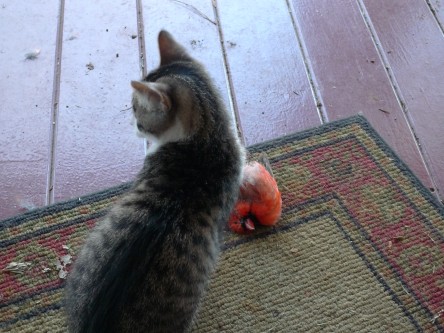Of course, Thomas Edison’s perspiration wouldn’t have produced marketable incandescent light bulbs without some other factors. How did Thomas Edison keep that hard work effective even if he couldn’t have always been efficient?
I think it’s safe to say that Edison worked very, very hard while building a team of brilliant, talented people. Or perhaps he attracted them. You may have heard this saying: “A rising tide floats all boats.†You may have also heard someone say, “If you want to be successful, you must surround yourself with successful people.â€
A habitat that celebrates ingenuity, perseverance, and resilience in the face of failure doesn’t simply happen like a fairy ring. Other kinds are more plentiful, and you’ll end up in one of these unless you know exactly what you’re looking for or intentionally grow a habitat yourself.
My first job out of grad school at a design and marketing firm involved creating press releases, writing web content, meeting with clients, and figuring out a way to sell social media strategy and tactics.
I have never claimed to be a graphic designer, but I have been told by graphic designers that I have “a good eye.†I would on occasion would see something on one of the designer’s screens that didn’t look quite right and would say so. Many of my observations even influenced the final version.
One day I was walking by the desk of the creative director, and I pointed something out and offered an alternate idea.
“Oh, so you’re a designer now?†he said.
The creative director had set himself up as the arbiter of good ideas. Quality control was his job, up to a point, but after he made one of the designers cry not one but twice and humiliated her in front of her co-workers—all for the purpose of helping her produce better work?—I should have realized that he felt threatened by other people’s talent and got territorial. He would sometimes assert the power of his title and squelch whatever playfulness and camaraderie we had all been feeling.
When management becomes obsessed with profitability and efficiency and tracks time in fifteen-minute increments, taking risks was about as welcome as roadkill in the foyer.
From what I can tell about Thomas Edison, he led the charge. His curiosity compelled him to take a lot of risks, and those risks brought rewards.
Though I took issue with the creative director’s style of leadership, I couldn’t help but empathize: he was frazzled, overworked and underappreciated. His boss was the last to show up at the office and the first to leave, and when Boss Man felt out of the loop, he would give everybody a tongue lashing, beginning with the creative director, and would then micro-manage all the projects for a day or two before vanishing again.
I learned later of circumstances that helped to explain their behavior, so I would like to give them the benefit of the doubt. I am thankful for all of the experiences I had with that company because I discovered one kind of habitat in which I could not thrive.
The Beatings-Will-Continue-Until-Morale-Improves may lead to compliance but it never encourages excellence. And you can’t do significant work without a significant amount of freedom, curiosity, and creativity. The freedom to make mistakes, the freedom to fail, is to excellence what water is to swimming.
Freedom leads to curiosity, and curiosity, to creativity, and creativity, to failure. Failure is inevitable, but whether it limits freedom, stifles curiosity, and cows creativity is not. A wise boss, a wise leader, says, “Try again.†A fearful one says, “Be more careful with company resources.†Fear often operates in the guise of practicality.
Curiosity was one of Edison’s greatest strengths: “If I try this, what will happen?†Now, repeat 10,000 times.
Creating a habitat that nurtures curiosity requires a leader who believes that good ideas can come from anywhere and who views failure as soil in which success grows.
Curiosity may kill cats, but the lack of it kills whatever legacy you might have left. To get the bird, the cat must sometimes climb the tall tree. Curiosity is inefficient and may lead you to dangerous places, but who wants to look back on a birdless life?


One Trackback
[…] a recent post, I wrote about the importance of curiosity. Thomas Edison never would have gotten 1093 patents without a mountain of it. Another personality […]